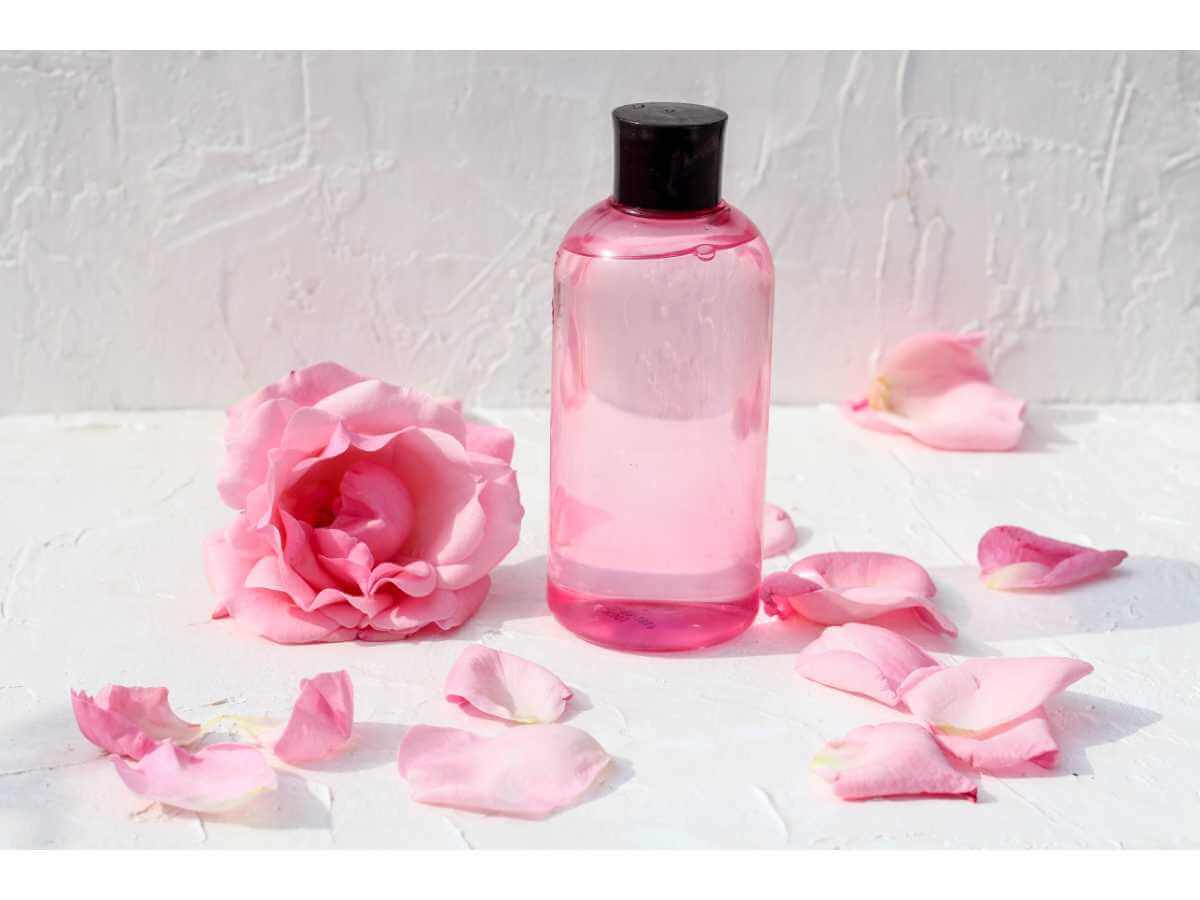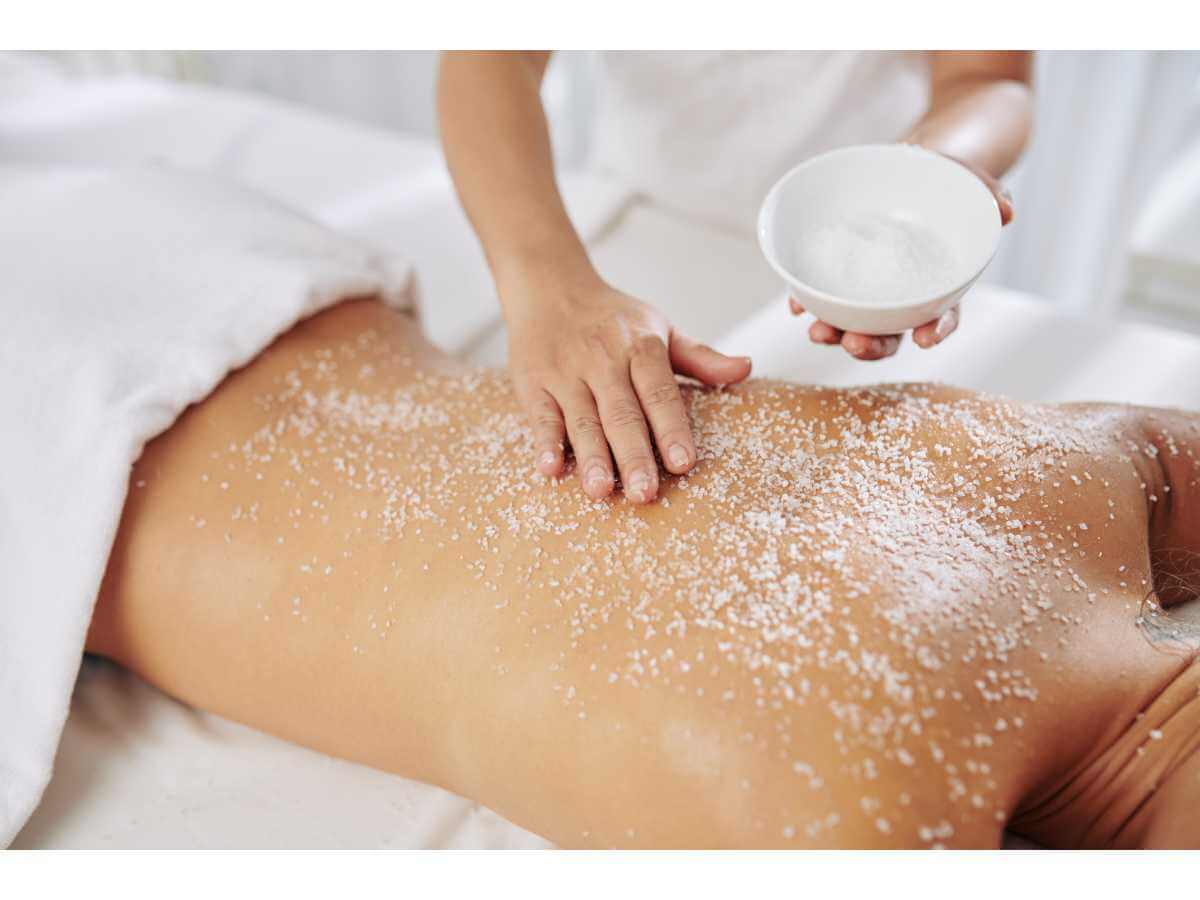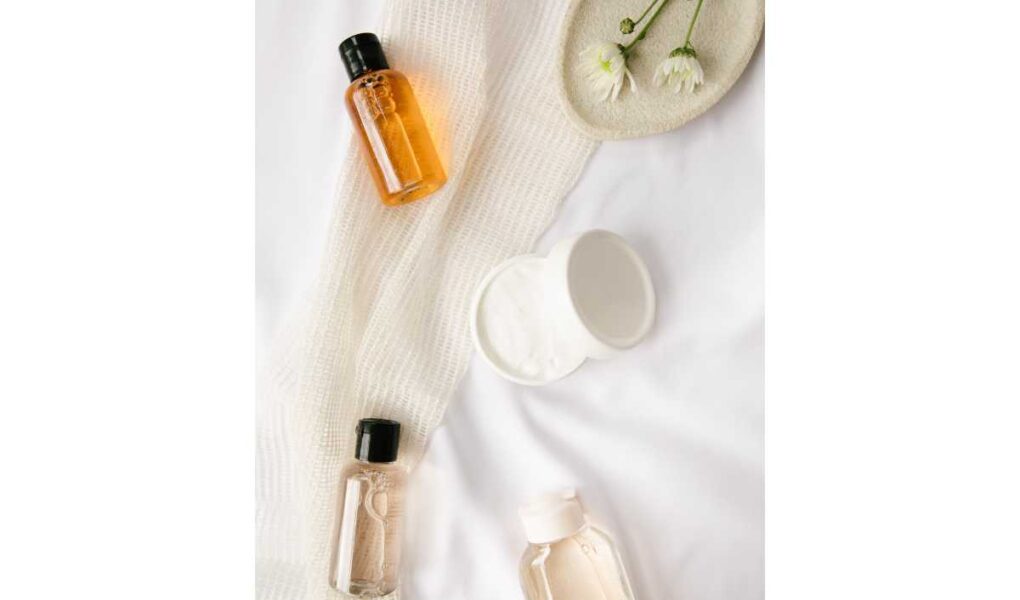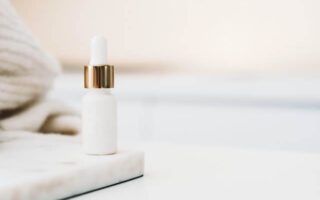The glowing, healthy skin you’d love to have starts with the right skincare products. But navigating the world of skincare can be overwhelming, especially with a plethora of products, each claiming to offer unique benefits. Two such products that often create confusion are toners and exfoliators.
Do you want to hydrate and balance your skin, or remove dead skin cells and impurities?
So, understanding the differences between them is key. But fear not, skincare warriors! We’re here to break down the key differences between these two essential products and help you incorporate them into your skincare routine. To make the best choice for your complexion, let’s take a closer look at toners v exfoliators.
What Is A Toner?
Toners are liquid-based skincare products that are primarily used after cleansing to restore the skin’s natural pH balance, hydrate, and prepare the skin for other skin care products. Traditional toners were formulated with alcohol and witch-hazel, but modern-day balancing and hydrating option toners are much gentler and often packed with beneficial ingredients, such as hyaluronic acid and aloe vera, making them more than just fancy skincare water.
What is An Exfoliator?
Exfoliators, on the other hand, are designed to remove dead skin cells, improve skin texture, and promote cell turnover. They come in various forms, such as physical exfoliants (scrubs and brushes), chemical exfoliants (alpha and beta-hydroxy acids), and enzyme exfoliators. We will discuss the types of exfoliants in detail in the upcoming sections below.
But first, let’s get to the main question!
Exfoliator vs Toner: Difference Between Toner and Exfoliator

The key differences between exfoliator and toner are:
Purpose and Function
The main difference between toners and exfoliators lies in their purpose and function. Toners are designed to balance the skin’s pH, hydrate, and prep the skin for further products, whereas exfoliators focus on removing dead skin cells and improving skin texture. This is why it’s crucial to understand their unique functions when incorporating them into your skincare routine.
Application and Usage
Toners are typically applied after cleansing using a cotton ball/pad or with the fingertips, while exfoliators are generally used after cleansing but before toning, depending on the product type. For example, a rinse-off exfoliant would be used after cleansing and then rinsed off, while a liquid exfoliant may be applied with a cotton pad or fingertips and left on the skin.
Product Formulation and Ingredients
Toners and exfoliators have the same base ingredients but differ in their formulation. While modern toners have moved away from harsh ingredients such as alcohol and now include hydrating and soothing ingredients, exfoliators can contain a range of active acids (e.g., alpha and beta-hydroxy acids) and physical exfoliants like granular particles or brushes. Each product type has specific ingredients and formulations that cater to different skin concerns and preferences.
Benefits of Using a Toner
Using a toner is an important step in any skincare routine. Some of the benefits of using a toner include but are not limited to:
Restoring pH Balance
One of the primary benefits of using a toner is to restore the skin’s pH balance. After cleansing, your skin may experience changes in its natural pH levels, leading to potential irritation or dryness. A good toner helps to bring your skin back to its normal pH, ensuring it stays healthy and balanced.
Prepping the Skin for Further Skincare Products
Lastly, toners play a crucial role in prepping the skin for the absorption of other skincare products. Applying a toner after cleansing keeps skin plump, clean, and ready to receive the benefits of serums, moisturizers, and other treatments.
Helps Improve the Absorption of Skincare Products Applied Afterward
Toners are designed to balance out the skin’s pH levels, which can become unbalanced due to everyday activities such as washing with harsh cleansers or using hot water. Additionally, toners help remove any remaining traces of leftover makeup or dirt that may still be present on the surface of the skin after cleansing. This allows other skincare products, such as moisturizers or serums, to penetrate deeper into the skin and work more effectively.
Hydrating and Refreshing the Skin
Toners also provide a much-needed hydration boost to your skin. Ingredients like hyaluronic acid and aloe vera work wonders to keep your skin hydrated, plump, and glowing. Also, it refreshes your skin and removes any residual impurities, making them a valuable addition to your skincare routine.
Reducing Pore Size and Enhancing Skin Tone
Another advantage of using a toner is its ability to reduce the appearance of pores and improve skin tone. Toners containing astringent ingredients can help tighten and refine the pores while brightening ingredients can even out the uneven skin tone and enhance overall radiance.
Improves Circulation to the Skin’s Surface for a Healthy Glow
Good circulation is essential for skin health, as it helps to keep the complexion looking bright and glowing. To improve circulation to the skin’s surface, toning is a great way to kickstart your routine. Toners are designed to help boost blood flow and reduce inflammation while removing any remaining traces of dirt or oil that may have been left behind after cleansing. They contain active ingredients such as witch hazel, alcohol or alpha hydroxy acids which work to remove excess oil and unclog pores. Additionally, many toners include astringents like menthol or camphor, which can help soothe irritated flaky skin and provide an instant refreshing feeling. Used regularly, toners can help promote healthy circulation for a more vibrant and youthful-looking complexion.
Benefits of Using an Exfoliator
Regular exfoliation is an important step in any skincare routine that can help to achieve brighter, healthier and smooth skin. Some of the major benefits of using an exfoliator include but are not limited to:
Removes Dead Skin Cells and Impurities from the Skin Surface
One of the main benefits of using an exfoliator is its ability to remove dead skin cells buildup that can lead to dull skin tones. Exfoliating toners, liquid exfoliants, and scrubs all work to slough away dead cells, revealing a brighter, more radiant complexion.
Stimulating Skin Cell Renewal
Exfoliating also promotes skin cell turnover, which can slow down with age or due to environmental factors. This process helps to keep your skin looking youthful and fresh, making exfoliation a key player in maintaining a healthy, radiant appearance.
Minimizing the Appearance of Fine Lines and Wrinkles
Exfoliating can also help to reduce the appearance of fine lines and wrinkles, as well as other signs of aging such as sun damage, acne scars, and dark spots. By encouraging cell turnover and revealing fresh, new skin, exfoliators can create a smoother, more even surface that minimizes the appearance of imperfections.
Enhancing Product Absorption
Lastly, exfoliating helps to improve the absorption of other skincare products by removing the layer of dead skin cells and impurities that can block their penetration. This allows your serums, moisturizers, and treatments to work more effectively, providing you with better results in your overall skincare routine.
Unclogs Pores to Help Reduce Acne Breakouts and Discoloration
Exfoliation helps unclog pores and reduce acne breakouts. Exfoliators are designed to slough away dead skin cells that have built up on the surface, allowing fresher and brighter skin to shine through. The exfoliating agents can also help reduce discoloration from sun damage, age spots or acne scars.
Types of Toners:

Some of the common types of toners are:
Hydrating Toners
Hydrating toners are great for those with dry skin as they help to restore moisture and balance pH levels. They often contain hydrating ingredients such as glycerin, aloe vera, and hyaluronic acid with hydrating properties which work to draw water into the skin, leaving it feeling soft and supple.
Clarifying Toners
Clarifying toners are designed to help clear away dirt, debris, and excess oil from the surface of the skin while also reducing the appearance of pores.
Alcohol-Free Toners
Alcohol-free toners are suitable for all skin types and can help to soothe redness or sensitivity while still providing a deep cleanse.
Witch Hazel Toners
Witch hazel toners can help reduce inflammation caused by acne or other breakouts while also providing antioxidant protection against free radicals.
Exfoliating Toners
Exfoliating toners are a great way to give your skin the deep cleaning it needs for a healthy complexion. They work by removing dead skin cells and other impurities from the surface of the skin, leaving behind a brighter and more radiant complexion. Exfoliating toners also help to unclog pores, reduce blackheads and whiteheads, and improve overall texture without making the skin dry and irritated. The exfoliating function is the main difference between exfoliating toners compared to hydrating.
pH-Balancing Toners
These toners are designed to help balance the pH of your skin after cleansing, which can help to improve the overall health and appearance of skin.
Types of Exfoliators

Chemical Exfoliators
Chemical exfoliators (Also called Liquid Exfoliators)use chemicals to dissolve and loosen the bonds between dead skin cells, causing them to shed more easily. Common types of chemical exfoliants include alpha-hydroxy acids (AHAs), beta-hydroxy acids (BHAs), and enzymes. Examples of AHAs include glycolic acid and lactic acid, while salicylic acid is a common BHA. Papaya and pineapple enzymes are popular enzyme exfoliants.
Physical Exfoliators
Physical exfoliators use abrasive, physical particles or substances that physically scrub away dead skin cells from the surface of your skin. Examples include scrubs with ingredients like sugar, salt, jojoba beads, or even coffee grounds.
Choosing the Right Toner for Your Skin Type
Toner for Oily Skin
For those with oily skin types, look for toners that contain ingredients to help control excess oil and minimize the appearance of pores. Ingredients like witch hazel, salicylic acid, and tea tree oil can help keep oily and acne-prone skin types in check.
Toner for Dry Skin
If you have dry skin, seek out toners that focus on hydration and soothing properties. Ingredients with gentler acids like hyaluronic acid, glycerin, and aloe vera can help provide much-needed moisture to parched skin.
Toner for Combination Skin
Combination skin types can benefit from toners that address both oily and dry areas of the skin. Look for a balanced formula that can help regulate oil production in the T-zone while providing hydration to the drier areas of the face.
Toner for Sensitive Skin
Sensitive skin types should opt for gentle, fragrance-free toners with soothing ingredients such as chamomile, calendula, and allantoin. Avoid harsh alcohol or other potential irritants that can exacerbate sensitivity.
Choosing the Right Exfoliator for Your Skin Type
Exfoliator for Oily or Acne-Prone Skin
Look for chemical exfoliators that contain salicylic acid or glycolic acid as they can help to unclog pores and control excess oil production. Avoid using harsh scrubs as they can irritate the greasy skin and cause inflammation.
Exfoliator For Dry or Sensitive Skin
Choose exfoliators that are gentle and contain moisturizing ingredients like jojoba beads or oatmeal. Avoid using exfoliators that contain AHAs or BHAs as they can be too harsh for your skin. Plus, avoid using physical exfoliators under any circumstances.
Exfoliator For Combination Skin
Use a combination of physical and chemical exfoliators to address both dry and oily areas. Choose exfoliators that contain both AHAs and BHAs to effectively unclog the clogged pores and improve skin texture.
Exfoliator For Mature Skin
Look for exfoliators that contain antioxidants or retinol as they can help to reduce the appearance of fine lines and wrinkles. Avoid using harsh scrubs as they can damage your skin and cause inflammation.
How to Incorporate Both Toner and Exfoliator in Your Skincare Routine?
Step-by-Step Skincare Routine
To effectively use both a toner and exfoliator in your routine, follow these steps:
- Cleanse your face with a gentle cleanser, removing any excess makeup and impurities. You can use a foam-based cleanser or normal PH. cleanser or even oil-based cleanser that suits your skin type.
- Exfoliate your skin, either with a chemical, physical, or enzyme exfoliator, according to your skin type and preference.
- Apply toner to a cotton swab/pad or your fingertips and gently pat it onto your face, focusing on areas that need extra hydration or balancing.
- Continue with your regular skincare routine, applying serums, moisturizers, and treatments as needed.
- Remember to adjust your routine based on your specific skincare needs and preferences.
Frequency of Use
The frequency of using toners and exfoliators depends on your skin type and the specific products you choose. Generally, toners can be used daily, both in the morning and at night time skincare routine while exfoliators should be used less frequently. For chemical exfoliators, start by using them once or twice a week and adjust them based on your skin’s tolerance. Physical and enzyme exfoliators can be used once or twice a week, depending on your skin’s needs.
Precautions and Tips for Toner and Exfoliator Usage

Avoid Over-Exfoliation
Over-exfoliation can lead to irritation, sensitivity, and damage to the skin barrier. To avoid this, be mindful of the frequency and strength of the exfoliants you use in your skincare process. Start slow and observe how your skin reacts, adjusting the frequency accordingly.
Patch Testing for Irritation and Allergies
Before incorporating new toners and exfoliators into your routine, perform a patch test on a small area of your skin to check for any allergic reactions or irritation. If you notice any redness, itching, or discomfort, discontinue use and consult a dermatologist if necessary.
Combining Skincare Products for Maximum Effectiveness
When using toners and exfoliators, ensure that you’re combining them with other products that complement their effects. For instance, if you’re using an exfoliator with active acids, follow up with a soothing and hydrating toner to help balance your skin.
Exfoliator vs Toner: Finding the Perfect Balance for Your Skin
In the end, the key to a successful skincare routine lies in finding the perfect balance between toners and exfoliators for your unique skin type and needs. By understanding the differences and benefits of each product, you can make informed choices that will help you achieve healthy, glowing skin.
Toner vs Exfoliator FAQs:
Can I use a toner and an exfoliator together?
Yes, you can incorporate both toner and exfoliator in your basic skin care routines. Apply the exfoliator after cleansing and then follow up with a toner to balance and hydrate your skin.
How often should I use an exfoliator?
The frequency of exfoliation depends on your skin type and the specific exfoliator you choose. Generally, you can exfoliate once or twice a week, but adjust the frequency based on your skin’s tolerance and needs. Always listen to your skin and avoid over-exfoliating to prevent irritation.
Can I use a toner if I have sensitive skin?
Yes, you can use a toner if you have sensitive skin, but choose a gentle, fragrance-free formula with soothing skin care ingredients like chamomile, calendula, and allantoin to prevent irritation.
What is the difference between a physical and chemical exfoliator?
Physical exfoliators use granular particles, brushes, or tools to physically remove dead skin cells, while chemical exfoliators use active chemical acids like AHAs, BHAs, or PHAs to dissolve the bonds between dead skin cells, promoting their removal. Physical exfoliators can be suitable for most skin types when used gently and sparingly, while chemical exfoliators cater to various skin types and concerns depending on the type of acid used. Learn more right here!
Can I use an exfoliator instead of a toner?
No, you cannot use an exfoliator instead of a toner since exfoliators and toners serve different purposes in a skincare routine. While exfoliators focus on removing dead skin cells and improving skin texture, toners help balance the skin’s pH, hydrate, and prepare the skin for other skincare products.
Is toner and exfoliator the same?
No, toner and exfoliator are not the same. Exfoliators remove dead skin cells, while toners balance skin’s pH and remove any remaining impurities after cleansing. They serve different functions in a skincare routine.



